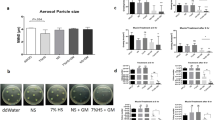Summary
pH-Dependent bactericidal activity on four gram-negative bacilli that are mainly responsible for gastric to airway colonisation has been investigated. Organisms studied were Escherichia coli, Enterobacter cloacae, Klebsiella pneumoniae and Serratia marcescens. At pH of the medium adjusted to 2.7 or lower all four organisms were killed in 1.5 h. At pH 3.1 or greater, no reduction in viable bacterial number was noted over 2 h. Even when pH of the medium was adjusted to 6.8, no increase in bacterial count was observed in 4h. Relevance of these findings in relation to airway colonisation and prophylaxis of acid aspiration and stress ulcer syndromes is discussed. It is suggested to maintain pH of the gastric contents above 4.0 by H2 antagonists and prevent growth of gram-negative organisms in the stomach by keeping it empty.
Similar content being viewed by others
References
Czaja AJ, McAlthanay JC, Pruitt BA (1974) Acute gastroduodenal disease after thermal injury: an endoscopic evaluation of incidence and natural history. N Engl J Med 291:925
Du Moulin GC, Hedley-White J, Paterson DG, Lisbon A (1982) Aspiration of gastric bacteria in antacid-treated patients: a frequent cause of postoperative colonisation of the airway. Lancet 1:242
Giannella RA, Broitman SA, Zamcheck N (1972) Gastric acid barrier to ingested micro-organisms in man: Studies in vivo and in vitro. Gut 13:251
Knight A, Bihari D, Tinker J (1985) Stress ulceration in the critically ill patient. Br J Hosp Med 19:216
Lucas CE (1981) Stress ulceration: the clinical problem. World J Surg 5:139
Martin LF, Martin HM, Polk HC (1980) Failure of gastric pH control by antacids or cimetidine in the critically ill, a valid sign of sepsis. Surgery 88:59
McElwee HP, Sirinek KR, Levine BA (1979) Climetidine affords protection equal to antacids in prevention of stress ulceration following thermal injury. Surgery 86:620
Mendelson CL (1946) The aspiration of stomach contents into the lungs during obstetric anaesthesia. Am J Obstet Gynecol 52:191
Pinder RM, Brogden RN, Sawyer RR, Speight TM, Avery GS (1976) Metolorpramide. A review of pharmacological properties and clinic use. Drugs 12:81
Priebe HJ, Skillman JJ (1981) Methods of prophylaxis in stress ulcer disease. World J Surg 5:223
Stothert JC, Dellinger EP, Simonowitz DA, Schilling JA (1980) Gastric pH monitoring as a prognostic indicator for the prophylaxis of stress ulceration in the critically ill. Am J Surg 140:761
Teabeaut JR. II (1952) Aspiration of gastric contents. An experimental study. Am J Pathol 28:51
Author information
Authors and Affiliations
Rights and permissions
About this article
Cite this article
Mehta, S., Archer, J.F. & Mills, J. pH-dependent bactericidal barrier to gram-negative aerobes: its relevance to airway colonisation and prophylaxis of acid aspiration and stress ulcer syndromes — study in vitro. Intensive Care Med 12, 134–136 (1986). https://doi.org/10.1007/BF00254927
Received:
Issue Date:
DOI: https://doi.org/10.1007/BF00254927




